Meta-skills are a set of high-level cognitive abilities that enable individuals to learn, adapt, and thrive in a rapidly changing world. These skills go beyond specific knowledge or technical expertise and are essential for success in a wide range of domains.
Just as a skilled craftsman knows which tool to use for a particular job, managers with strong meta-skills can identify which skill or combination of skills to use to solve a particular problem or achieve a goal.
Meta Skills
Meta-skills require ongoing development and refinement to stay relevant and effective in a rapidly changing world. I encourage you to explore the following meta-skills to help you become a better manager and leader.
1. Self-Management
Self-management is your ability to manage your thoughts, emotion, and behavior to ensure that you remain productive at work or wherever you are. You can say that it is one of the most important meta-skills you need as a manager.
A mentor once told me that you cannot be a good manager if you cannot even manage your daily activities.
To develop self-management skills, you will need other skills too. You need time management, self-motivation, stress management, adaptability, stress management, goal-alignment, and decision-making.
2. Mindfulness.
A mindful manager is intentional in his actions. That means he has the ability to act on things that really matter. It is the ability to be fully present, and aware of where you are and what you can do in varying situations.
A mindful manager has the ability to see conflict as an opportunity for growth and collaboration. You can say that a mindful manager is purpose-driven.
You can develop mindfulness through various techniques and practices. Here are some strategies to consider:
Meditation: Start by practicing a few minutes of meditation each day, gradually increasing the duration as you become more comfortable with the practice.
Mindful breathing: Practice taking deep, slow breaths and focusing your attention on the sensations of breathing.
Mindful walking: Mindful walking involves focusing your attention on the physical sensations of walking, such as the movement of the feet and the rhythm of the breath. This technique can be practiced during a short walk or during daily activities such as taking the stairs instead of the elevator.
Mindful listening: Mindful listening involves focusing your attention on the speaker and avoiding distractions such as multitasking or interrupting. This technique can help you improve your communication skills and build positive relationships with team members.
Developing mindfulness requires regular practice and a commitment to being in the here and now. Practice a few minutes of mindfulness each day and gradually increase the duration as you become more comfortable with the practice.

3. Big-Picture Thinking
An excellent manager has the ability to connect the dots. He has the ability to connect one piece of a puzzle to another. This is why we say that an excellent manager is a good problem solver.
They have the ability to use facts, make sense by connecting them together, gain insights and find solutions. They use their intuition too to fill in the gaps.
Developing big-picture thinking is essential for managers who want to make strategic decisions and guide their organizations to success. Here are some strategies you can use for developing big-picture thinking:
Gather information: Gather information about the industry, the competition, and the organization’s internal operations to understand the big picture better. Conduct research, attend industry events, and talk to stakeholders.
Analyze trends: Analyze industry and market trends to identify opportunities and threats. Track changes in consumer behavior, technology advancements, and regulatory developments.
Connect the dots: Big-picture thinking requires connecting seemingly unrelated pieces of information and seeing patterns and trends. You can practice connecting the dots by looking for relationships between data points and asking questions to uncover underlying causes and effects.
Foster creativity: Big-picture thinking requires creativity and an open mind. You can foster creativity by encouraging team members to generate new ideas and approaches, and by creating a culture that values experimentation and risk-taking.
Collaborate with others: Big-picture thinking often requires collaboration with others with different perspectives and expertise. Collaborate with team members, other departments, or external partners to gain new insights and identify opportunities.
4. Learning Agility
Learning agility is the ability to learn quickly and adapt to new situations.
In the VUCA world, you do not always get the complete picture. Even facts are ambiguous. You need agility to thrive.
There was a time that innovation was a special project, not a core strategy of the organization. But now, we see that learning on the fly is a competitive advantage.
Excellent managers possess agility or the ability to think, understand, and make decisions quickly. They cannot wait until all facts are in before they make decisions. Because by the time that all facts are in, it would be too late.
In one of my interviews, a manager said that when he learned that an employee tested positive for Covid-19, he at once decided that all employees will work from home the next day. This after he failed to reach their country managers. He ensures that everything gets done.
Managers with strong learning agility can quickly adjust to market, industry, or organization changes and stay ahead of the curve.
Here are some strategies for developing learning agility:
Seek feedback: Seek feedback from others, including team members, peers, and mentors, to identify areas for improvement and build self-awareness. Use this feedback to identify specific learning goals and create action plans for achieving them.
Learn from experience: Learn from their own experiences by reflecting on past successes and failures and identifying lessons learned. This can involve journaling, debriefing after a project or presentation, or seeking feedback from others.
Stay curious: Learning agility requires a curious and open mind. Ask questions, seek new information, and explore new ideas and perspectives.
Develop a growth mindset: A growth mindset is a belief that skills and abilities can be developed through hard work and dedication. Develop a growth mindset by focusing on the learning process rather than just the outcome, embracing challenges and setbacks as opportunities for growth, and seeking feedback and new learning opportunities.
Continuous learning: Developing learning agility requires a commitment to continuous learning. Seek new learning opportunities, such as attending conferences, workshops, or training sessions, reading books and articles on relevant topics, or seeking mentors or coaches.
5. Empathy
Empathy goes beyond the ability to understand the feelings of others. As a manager, it means that you will factor in the situation of your people. You will choose between productivity and safety when you can do both.
Managers must understand what people are feeling now. Some of us are still working from home. And working is not the same thing as sitting on your chair and doing work.
That’s not how it works.
People are anxious. People don’t know what’s happening and what will happen to them. The situation of every employee is never the same.
This requires supervisors to find out where the employees are coming from. Most of us call this compassionate leadership. To me, is malasakit in practice.
Read: Be interested in people.
Read: Malasakit, the Culture of Caring for Others
6. Resilience
Resilience is not only the ability to bounce back. Resilience is the ability of leaders to bounce forward when encountering seemingly insurmountable challenges like Covid-19.
Resilience goes beyond our ability to handle stress. It comes with the clear understanding that sometimes we fail, and sometimes we win. That is a long game. But as long as we learn from our experiences, we can move forward and make things better.
A resilient supervisor thrives under pressure and drives his team to higher performance.
7. Adaptive Leadership
Adaptive managers help employees adapt to significant change. Instead of waiting and seeing for problems to pass, they consider the “what ifs” and look for ways to handle them. Instead of sticking to old ways of solving problems, they find new ways.
As I have mentioned before, the Philippine government failed us many times during the height of the pandemic. Duterte believed that the Covid-19 pandemic can be solved by a military solution. So, instead of making medical experts decide, he made ex-generals take the lead. The old man thought kerosene was the cure for Covid.
We need military generals for their expertise. But they are not used to bringing diverse groups of people to the table, listening to them, and making decisions that have never been done before. They’ve got to stick to what they’ve been good at, though it does not prevent the virus from spreading.
An adaptive leader knows that there is no single solution. His ability to bring the wisdom of people, make them own the solutions and mobilize them so that significant change happens.
Every manager needs to become an adaptive leader.
8. Creativity
Creativity is an important meta-skill for managers because it can help them adapt to change, drive innovation, and improve organizational performance.
Creativity can help managers come up with new ideas, strategies, and approaches that can differentiate their organizations from competitors, improve efficiency and effectiveness, and enhance customer satisfaction. It can also help them identify and capitalize on new opportunities, such as emerging technologies or market trends.
Creativity can foster a positive work environment and promote employee engagement and motivation.
When managers encourage and support creativity, they empower their employees to use their own unique perspectives and skills to contribute to the organization.
As a manager, you can create a work environment that encourages and supports creativity. Here are some ways that managers can foster creativity in their teams:
Encourage idea generation: Encourage the team to generate new ideas, regardless of how wild or unconventional they may seem. Encourage brainstorming sessions and provide opportunities for the team to share their ideas.
Provide time for creativity: Allow the team to spend time on creative pursuits, such as developing new products or services, or experimenting with new ideas. This can be done through dedicated “innovation time” or by incorporating creative thinking into regular team meetings. Many organizations allow employees to spend 20% of their time in creative pursuits outside of the office.
Foster a culture of experimentation: Encourage the team to experiment with new approaches and ideas, even if they are uncertain of the outcome.
Encourage collaboration: Encourage the team to work together and share their ideas and insights. This can help to spark new ideas and foster a culture of creativity.

9. Critical Thinking
Critical thinking helps managers make better decisions, solve problems more effectively, and improve organizational performance.
It allows them to make informed and effective decisions based on sound reasoning and analysis. Critical thinking involves analyzing information, evaluating arguments and evidence, and making logical and reasoned judgments based on that analysis.
Critical thinking enables managers to identify and evaluate the strengths and weaknesses of various options and to choose the best course of action based on the available information.
It also helps managers identify potential problems before they occur and to develop effective solutions to address them.
As a manager, you ought to develop your critical thinking skills. I suggest you do the following:
Managers can develop critical thinking by practicing and applying specific techniques that encourage analytical and logical thinking. Here are a few ways managers can develop critical thinking skills:
Ask questions: Ask questions, challenge assumptions, and consider multiple perspectives. Ask “why?” and “what if?” questions to explore different possibilities.
Consider different viewpoints: Consider different viewpoints and challenge your own assumptions and biases. This can help you gain a broader perspective and make more informed decisions.
Break down complex problems: Break down complex problems into smaller, more manageable parts. This can help you identify the root causes of a problem and develop more effective solutions.
Use logic and reasoning: Use logic and reasoning to evaluate arguments and evidence. This can help you make more informed and effective decisions based on sound analysis.
Developing critical thinking skills requires practice and effort. By practicing these techniques constantly you can help yourself and your team develop critical thinking skills.
10. Emotional Intelligence
Emotional intelligence refers to the ability to recognize and manage one’s own emotions and those of others and to use this knowledge to build positive relationships, motivate team members, and manage conflicts.
Managers who are emotionally intelligent are better able to understand the needs and perspectives of team members, and to communicate with them in a way that builds trust and respect.
Emotionally intelligent managers recognize the emotions and motivations of team members and use this knowledge to create a positive and supportive work environment that fosters motivation, engagement, and productivity.
They manage conflicts and resolve disputes in a constructive and positive way, without letting emotions get in the way.
They regulate their own emotions and make decisions based on rational analysis rather than emotional reactions.
There are several ways you can develop your emotional intelligence. Here are some strategies to consider:
- Increase self-awareness by paying attention to your emotions and how they influence behavior. Practice mindfulness techniques, such as meditation or journaling, to improve self-awareness.
- Once you become aware of your own emotions, you can learn techniques to regulate them in a positive way. This may involve deep breathing, visualization, or cognitive reframing.
- Develop empathy by actively listening to team members and trying to understand their perspectives. Practice putting yourself in others’ shoes and imagining how they might feel in a particular situation.
- You can improve your emotional intelligence by communicating openly and honestly with team members. Provide feedback in a constructive way and seek feedback from others.
Leadership training can help you create limitless possibilities. I recommend you explore the training programs I offer to managers, supervisors, and team leaders.
No posts
If you’re tired of knowing but not doing…
Let’s make one shift easier to live daily.
→ Shift Experiences


